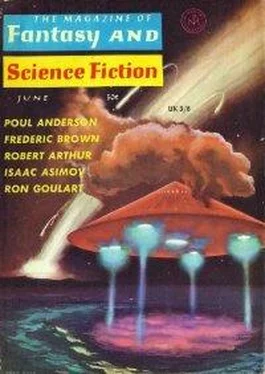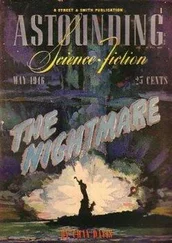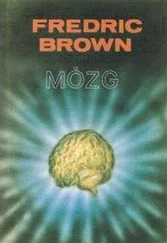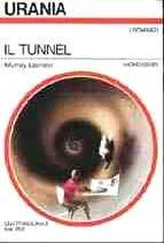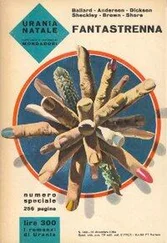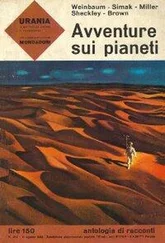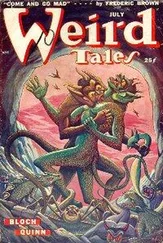Fredric Brown - Eine Kleine Nachtmusik
Здесь есть возможность читать онлайн «Fredric Brown - Eine Kleine Nachtmusik» весь текст электронной книги совершенно бесплатно (целиком полную версию без сокращений). В некоторых случаях можно слушать аудио, скачать через торрент в формате fb2 и присутствует краткое содержание. Год выпуска: 1965, Издательство: Mercury Press, Inc., Жанр: Фантастика и фэнтези, на английском языке. Описание произведения, (предисловие) а так же отзывы посетителей доступны на портале библиотеки ЛибКат.
- Название:Eine Kleine Nachtmusik
- Автор:
- Издательство:Mercury Press, Inc.
- Жанр:
- Год:1965
- ISBN:нет данных
- Рейтинг книги:3 / 5. Голосов: 1
-
Избранное:Добавить в избранное
- Отзывы:
-
Ваша оценка:
- 60
- 1
- 2
- 3
- 4
- 5
Eine Kleine Nachtmusik: краткое содержание, описание и аннотация
Предлагаем к чтению аннотацию, описание, краткое содержание или предисловие (зависит от того, что написал сам автор книги «Eine Kleine Nachtmusik»). Если вы не нашли необходимую информацию о книге — напишите в комментариях, мы постараемся отыскать её.
Eine Kleine Nachtmusik — читать онлайн бесплатно полную книгу (весь текст) целиком
Ниже представлен текст книги, разбитый по страницам. Система сохранения места последней прочитанной страницы, позволяет с удобством читать онлайн бесплатно книгу «Eine Kleine Nachtmusik», без необходимости каждый раз заново искать на чём Вы остановились. Поставьте закладку, и сможете в любой момент перейти на страницу, на которой закончили чтение.
Интервал:
Закладка:
Passing the desk on his way out he asked the clerk—a man who looked fully as old as the hostelry itself—for directions toward the center of town, the lively spots. Outside, he started in the direction the old man had indicated, but the streets were so crooked, the fog so thick, that he was lost within a few blocks and no longer knew even the direction from which he had come. So he wandered on aimlessly and in another few blocks found himself in an eerie neighborhood. This eeriness, without observable cause, unnerved him and for a panicked moment he started to run to get through the district as fast as he could, but then he stopped short as he suddenly became aware of music in the air—a weird, haunting whisper of music that, after he had listened to it a long moment, drew him along the dark street in search of its source. It seemed to be a single instrument playing, a reed instrument that didn’t sound exactly like a clarinet or exactly like an oboe. It grew louder, then faded again. He looked in vain for a light, a movement, some clue to its birthplace. He turned to retrace his steps, walking on tiptoe now, and the music grew louder again. A few more steps and again it faded and Dooley retraced those few steps and paused to scan the somber, brooding building. There was no light behind any window. But the music was all around him now and—could it be coming up from below? Up from under the sidewalk?
He took a step toward the building, and saw what he had not seen before. Parallel to the building front, open and unprotected by a railing, a flight of worn stone steps led downward. And at the bottom of them, a yellow crack of light outlined three sides of a door. From behind that door came the music. And, he could now hear, voices in conversation.
He descended the steps cautiously and hesitated before the door, wondering whether he should knock or simply open it and walk in. Was it, despite the fact that he had not seen a sign anywhere, a public place? One so well-known to its habitues that no sign was needed? Or perhaps a private party where he would be an intruder?
He decided to let the question of whether the door would or would not turn out to be locked against him answer that question. He put his hand on the latch and it opened to his touch and he stepped inside.
The music reached out and embraced him tenderly. The place looked like a public place, a wine cellar. At the far end of a large room there were three huge wine tuns with spigots. There were tables and people, men and women both, seated at them. All with wineglasses in front of them. No steins; apparently only wine was served. A few people glanced at him, but disinterestedly and not with the look one gave an intruder, so obviously it was not a private party.
The musician—there was just one—was in a far corner of the room, sitting on a high stool. The room was almost as thick with smoke as the street had been thick with fog and Dooley’s eyes weren’t any too good anyway; from that distance he couldn’t tell if the musician’s instrument was a clarinet or an oboe or neither. Any more than his ears could answer that same question, even now, in the same room.
He closed the door behind him, and weaved his way through the tables, looking for an empty one as close to the musician as possible. He found one not too far away and sat down at it. He began to study the instrument with his eyes as well as his ears. It looked familiar. He’d seen one like it or almost like it somewhere, but where?
“ Ja, mein Herr? ” It was whispered close to his ear, and he turned. A fat little waiter in lederhosen stood at his elbow. “Zinfandel? Burgundy? Riesling?”
Dooley knew nothing about wines and cared less, but he named one of the three. And as the waiter tiptoed away, he put a little pile of marks on the table so he wouldn’t have to interrupt himself again when the wine came.
Then he studied the instrument again, trying for the moment not to listen to it, so he could concentrate on where he’d once seen something like it. It was about the length of his clarinet, with a slightly larger, more flaring bell. It was made—all in one piece, as far as he could tell—of some dark rich wood somewhere in color between dark walnut and mahogany, highly polished. It had finger holes and only three keys, two at the bottom to extend the range downward by two semitones, and a thumb operated one at the top that would be an octave key.
He closed his eyes, and would have closed his ears had they operated that way, to concentrate on remembering where he’d seen something very like it. Where?
It came to him gradually. A museum, somewhere. Probably in New York, because he’d been born and raised there, hadn’t left there until he was twenty-four, and this was longer ago than that, like when he was still in his teens. Museum of Natural Science? That part didn’t matter. There had been a room or several rooms of glass cases displaying ancient and medieval musical instruments: viola da gambas and viola d’amores, sackbuts and panpipes and recorders, lutes and tambours and fifes. And one glass case had held only shawms and hautboys, both precursors of the modern oboe. And this instrument, the one to which he was listening now in thrall, was a hautboy. You could distinguish the shawms because they had globular mouthpieces with the reeds down inside; the hautboy was a step between the shawm and the oboe. And the hautboy had come in various stages of development from no keys at all, just finger holes, to half a dozen or so keys. And yes, there’d been a three-keyed version, identical to this one except that it had been light wood instead of dark. Yes, it had been in his teens, in his early teens, that he’d seen it, while he was a freshman in high school. Because he was just getting interested in music and hadn’t yet got his first clarinet; he’d still been trying to decide which instrument he wanted to play. That’s why the ancient instruments and their history had fascinated him for a brief while. There’d been a book about them in the high-school library and he’d read it. It had said— Good God, it had said that the hautboy had a coarse tone in the lower register and was shrill on the high notes! A flat lie, if this instrument was typical. It was smooth as honey throughout its range; it had a rich full-bodied tone infinitely more pleasing than the thin reediness of an oboe. Better even than a clarinet; only in its lower, or chalumeau, register could a clarinet even approach it.
And Dooley Hanks knew with certainty that he had to have an instrument like that, and that he would have one, no matter what he had to pay or do to get it.
And with that decision irrevocably made, and with the music still caressing him like a woman and exciting him as no woman had ever excited him, Dooley opened his eyes. And since his head had tilted forward while he had concentrated, the first thing he saw was the very large goblet of red wine that had been placed in front of him. He picked it up and, looking over it, managed to catch the musician’s eye; Dooley raised the glass in a silent toast and downed the wine in a single draught.
When he lowered his head after drinking—the wine had tasted unexpectedly good—the musician had turned slightly on the stool and was facing another direction. Well, that gave him a chance to study the man. The musician was tall but thin and frail looking. His age was indeterminate; it could have been anywhere from forty to sixty. He was somewhat seedy in appearance; his threadbare coat did not match his baggy trousers and a garish red and yellow striped muffler hung loosely around his scrawny neck, which had a prominent Adam’s apple that bobbed every time he took a breath to play. His tousled hair needed cutting, his face was thin and pinched, and his eyes so light a blue that they looked faded. Only his fingers bore the mark of a master musician, long and slim and gracefully tapered. They danced nimbly in time with the wondrous music they shaped.
Читать дальшеИнтервал:
Закладка:
Похожие книги на «Eine Kleine Nachtmusik»
Представляем Вашему вниманию похожие книги на «Eine Kleine Nachtmusik» списком для выбора. Мы отобрали схожую по названию и смыслу литературу в надежде предоставить читателям больше вариантов отыскать новые, интересные, ещё непрочитанные произведения.
Обсуждение, отзывы о книге «Eine Kleine Nachtmusik» и просто собственные мнения читателей. Оставьте ваши комментарии, напишите, что Вы думаете о произведении, его смысле или главных героях. Укажите что конкретно понравилось, а что нет, и почему Вы так считаете.
